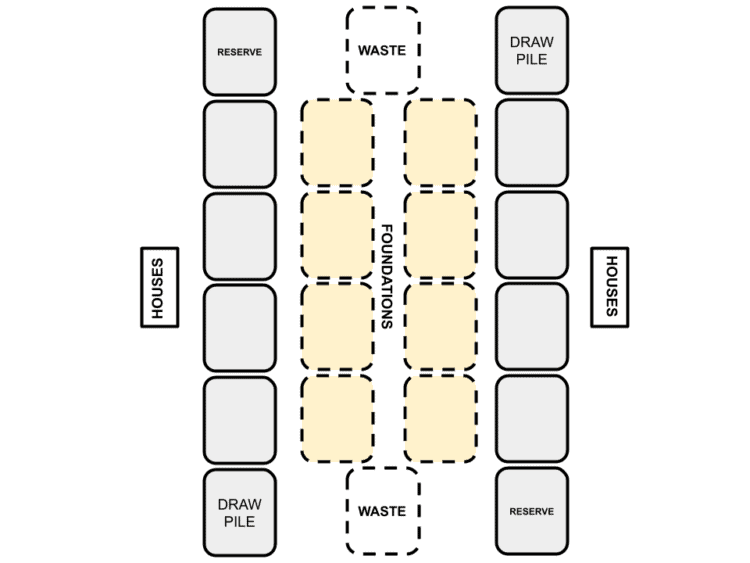
OBJECTIVE OF RUSSIAN BANK: Be the first player to earn 300 points or more.
NUMBER OF PLAYERS: 2 players
NUMBER OF CARDS: 104 cards
RANK OF CARDS: (low) Ace – King (high)
TYPE OF GAME: Double Solitaire
AUDIENCE: Adults
INTRODUCTION OF RUSSIAN BANK
Russian Bank is a game known by many names including Crapette, Zank-Patience, Streitpatience, Tonj, and more! It has even been commercialized with some changes in gameplay. This game is known as Skip Bo.
This is a two player solitaire style game that challenges players to build up a tableau and foundations with cards from their piles. It plays a lot like solitaire, but with a different objective. Players do not have to build up complete foundations, instead they simply have to get rid of all the cards from their draw, waste, and reserve piles.
THE CARDS & THE DEAL
Russian Bank is a double solitaire style game played with two 52 card French decks. Typically, players sit across from each other while playing.
Each player shuffles their decks. Each player deals twelve cards face down and a thirteenth card face up on top of the pile. This pile is called the reserve, and it is located on the player’s right. Each player has their own reserve pile.
Players each deal four cards face up in a column above their reserve pile. These four cards are called houses. There should be a space two cards wide between the columns. This will be the location of the foundation piles. During the game, all eight houses and all of the foundation spaces can be played upon by both players.
At this point, each player will have thirty five cards left in their decks. This deck should be placed face down on the opposite side of the reserve pile. This is the player’s draw pile. The space between the draw pile and the reserve pile is for the waste pile.

THE PLAY
The player with the lowest valued card showing on their reserve pile goes first. If the cards are equal, compare the first house cards.
During a player’s turn, moves must take place in a specific order. Cards that are located on top of the reserve pile and houses must be played first. When the top card from the reserve pile is played, the next card is flipped over. That card must be played if able.
When you are out of required moves, you may flip the top card of the draw pile over. Once that card is played, the player must then go back through their reserve cards and the house cards and make any moves that are available.
Cards can also be played on an opponent’s reserve and waste pile. Cards must be the same suit, and can be played in both ascending or descending order. For example, if the top card is a J♦, a 10♦ or a Q♦ can be played on it.
This continues until the next card a player draws from the draw pile cannot be played. When this occurs, that card is discarded to the waste pile, and the turn is ended. Waste pile cards cannot be played until the draw pile is depleted.
Foundations are started with an Ace and built in ascending order to the same suited King. Cards that can be played to the foundations must be played first.
Houses are built in descending order by alternating color, and they are staggered so the whole house can be seen. If you empty a house during your turn, it must immediately be filled with a card from your reserve pile (if you have any).
Once a player has discarded to their waste pile, their turn ends. Play passes to the opponent.
Play like this continues until one player has emptied their reserve, draw, and waste pile. A stalemate may also occur.
SCORING
If a player empties all of their piles, they earn 30 points for winning the round. They earn 1 point for each card left in their opponent’s draw and waste piles. They earn 2 points for each card left in their opponent’s reserve pile.
If a stalemate occurs, each player gets 1 point for each card left in their draw and waste pile. They get 2 points for each card left in their reserve pile. Whoever has the lower score earns points equal to the difference between the two totals.
WINNING
The first player to earn 300 points or more wins the game.
- TRIPLE SNAKES - February 15, 2021